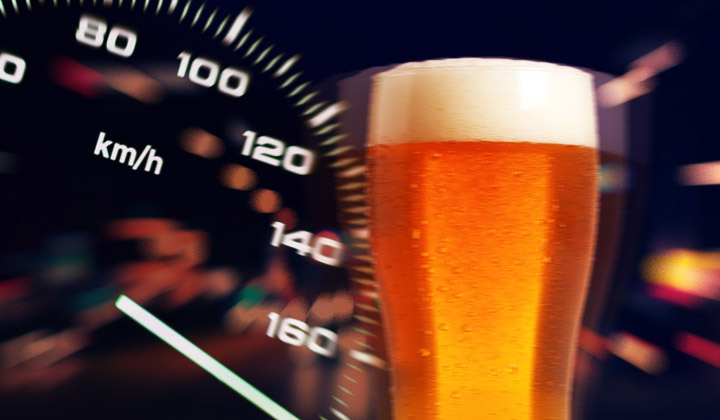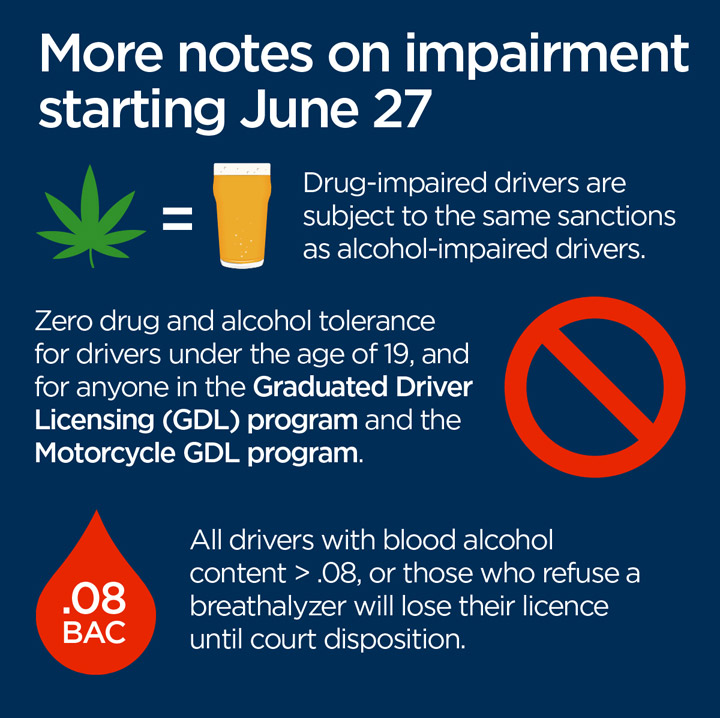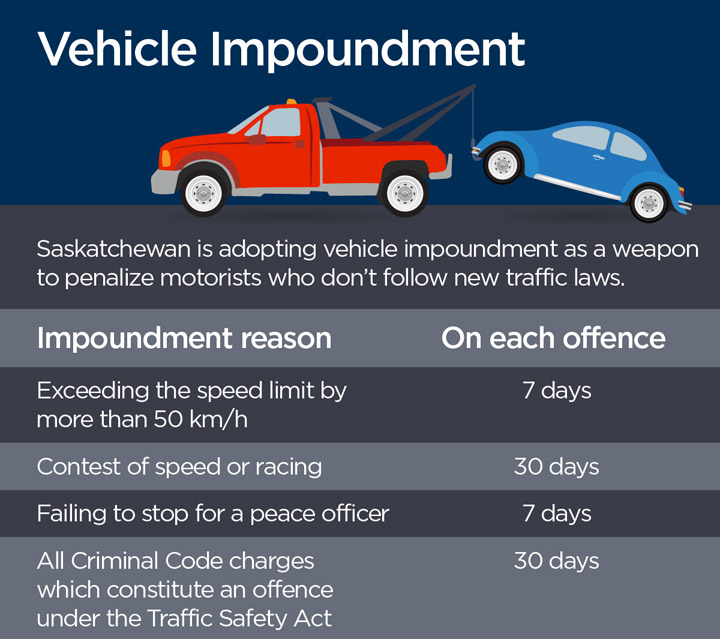SASKATOON – Saskatchewan traffic safety laws are changing Friday in an effort to prevent deaths, serious injuries and property damage.

In 2012, the province saw a spike in traffic deaths; 183 people were killed on provincial roads that year, making it the deadliest year on record.
According to preliminary figures from Saskatchewan Government Insurance (SGI), there were 134 fatalities in 2013, but there were also 4,212 impaired driving-related convictions.
While alcohol remains the number one cause of traffic deaths in the province, distracted driving was cited as the leading cause of fatal crashes in 2012.
The province responded by creating an all-party special committee in 2013 to review the high rate of fatalities in Saskatchewan. The committee heard feedback from 27 public presentations before making recommendations it hopes will save lives.
“Distracted driving and excessive speed are high-risk behaviours that lead to collisions,” said Andrew Cartmell, SGI CEO and president.
“In fact, along with impaired driving, they make up the top contributing factors in fatal crashes in our province.”
A number of these recommendations will manifest as new traffic laws consequences in the areas of impaired driving, distracted driving and speed.
Impaired driving licence suspensions
Starting Friday, the province will strengthen administrative sanctions for impaired driving based on driver experience, including mandatory ignition interlock and vehicle impoundments.
“We are all hopeful the more serious consequences associated with risky driving behaviour will result in drivers making safer and smarter choices, ultimately leading to fewer traffic injuries and fatalities in our province,” said Don McMorris, the minister responsible for SGI.
The special committee found that the victims of these fatal accidents are disproportionately teenagers and young adults.
In response, zero drug and alcohol tolerance has been expanded to all drivers under the age of 19 and all learners, including motorcyclists.
An inexperienced driver caught for the first time will face a 60-day license suspension and the vehicle will be impounded for three days. Subsequent offences have harsher penalties.
The ‘legal alcohol limit’ for experienced Saskatchewan drivers continues to be .04 BAC to less than .08 BAC, but penalties are now more severe.
Drivers at these levels do not face criminal impaired driving charges but can be subject to roadside suspensions, impoundment and ignition interlock.
A first offence for an experienced driver between .04 and .08 BAC carries an immediate 3-day licence suspension and a mandatory DWI course.
Frank Regier illustrated the worry that exists regarding impaired driving to the special committee last year.
“Drunk driving is a big concern with me because I’ve seen people, you know, get charged with impaired driving. They get a suspension, they drive while they’re suspended. They get caught driving when suspended, they get a little fine, an extension on the suspension and they’re back on the road. And it’s terrifying,” said Regier.
To combat this, the province is enlisting new consequences.
All drivers registering greater than .08 BAC, or refusing to provide a breath sample will now face an immediate license suspension up to court disposition.
This new sanction is concerning to Regina lawyer Jeremy Ellergodt, an associate at McKercher LLP.
He says these people could be waiting between six to 18 months.
Impaired driving fines
Saskatchewan will soon have the tools it needs to address impaired driving and make punishments stick where it hurts, the wallet.
Under the new Safe Driver Recognition (SDR) program, convicted drivers who blow .08 to .15 BAC will face a fine of $1,250. If a driver is at or over .16 BAC, the fine jumps tp $2,250
Before June 27, the maximum financial penalty was $500.
Mandatory ignition locks
Convicted motorists over .08 BAC will no longer have a choice with ignition interlock, it’s mandatory.
These devices prevent drivers from operating a vehicle if they have alcohol in their body.
Drivers subject to alcohol-related driving suspensions are responsible for installation. It costs $180 to install the device, plus a monitoring fee of $3.45 per day.
An upcoming new law will penalize all impaired drivers – no matter the drug.
A report of the Canadian Council of Motor Transport Administration from 2010 indicated that for drivers fatally injured in Saskatchewan, about half had signs of some illicit drug present.
The change to impaired driving legislation makes the consequences for drug impairment as serious as the consequences for alcohol.
SGI says proving drug impairment is complex as there are many types of drugs and combinations that could be at play; even prescription medications are included.
The province’s 32 drug recognition experts (DREs) are trained in physical testing conducted at roadside. If drug impairment is suspected, police will take the driver in for further testing.
SGI is currently working with Saskatchewan law enforcement to increase the number of DREs.
Vehicle impoundment
People caught driving impaired or engaging in other high-risk driving behaviours will face vehicle seizure consequences when new laws come into effect June 27.
The special committee made recommendations based on results of its research and consultations. The committee chose these serious offences as they are contributing factors in crashes.
“We believe harsher penalties, including the inconvenience of being without a vehicle for several days, will deter people from choosing to drive while impaired, or using a cellphone,” said Cartmell.
“Short-term vehicle seizures have been credited with reducing fatalities related to impaired driving in B.C. and Alberta, and we hope to see a similar impact in Saskatchewan.”
READ MORE: B.C.’s tough drinking and driving laws reduce deaths by 52 per cent
Seizures will range from three to 60 days, depending on the number of previous offences on a driver’s record.
The vehicle’s owner will be responsible for all expenses.
Towing fees range from $55 to $50 plus two dollars per kilometre outside of Regina or Saskatoon. Fees increase if the gross vehicle weight (GVW) is over 5,500 kg.
Owners will buy a $50 vehicle impoundment release certificate from SGI and pay all fees to the garage keeper before the vehicle can be released. Storage fees are $10 per day.
Distracted driving penalties
In fatal collisions, driver inattention/distraction is the second most commonly cited factor in Saskatchewan.
It is also likely that these offences are under-reported; as with many distractions, it is difficult to prove they were a factor if the driver or other vehicle occupant does not volunteer the information.
According to SGI preliminary numbers, there were 4,330 convictions for using an electronic communication device while driving last year.
Starting Friday, vehicles can be impounded for a week for a drivers’ second use of cell or smart phone offence within one year.
The fine for using electronic communication equipment while driving remains $280 and four demerit points under SGI’s Safe Driver Recognition program.
The same penalty applies for eating, putting on makeup or reading at the steering wheel.
Excessive speed
The third leading cause of roadway fatalities in Saskatchewan is speed.
WATCH: Shocking commercial shows dangers of speeding
Each year, over 24,600 unsafe speed-related collisions claim an average of 45 lives in the province.
SGI says current initiatives and enforcement efforts are not improving the situation.
Collisions due to excessive speed are generally severe – about 67 per cent of excessive speeding collisions result in injury or death.
There is a new offence for driving twice the speed limit in Saskatchewan.
The fine starts at $140, plus four dollars for each km/h in excess. Drivers will lose four points under the SDR program and a second offence within a year could result in vehicle impoundment for a week.
READ MORE: New police units to watch over deadly Saskatchewan roads
SGI is reminding motorists to always plan a safe ride home, put cell and smart phones away while driving and slow down to make sure everyone arrives alive.









Comments